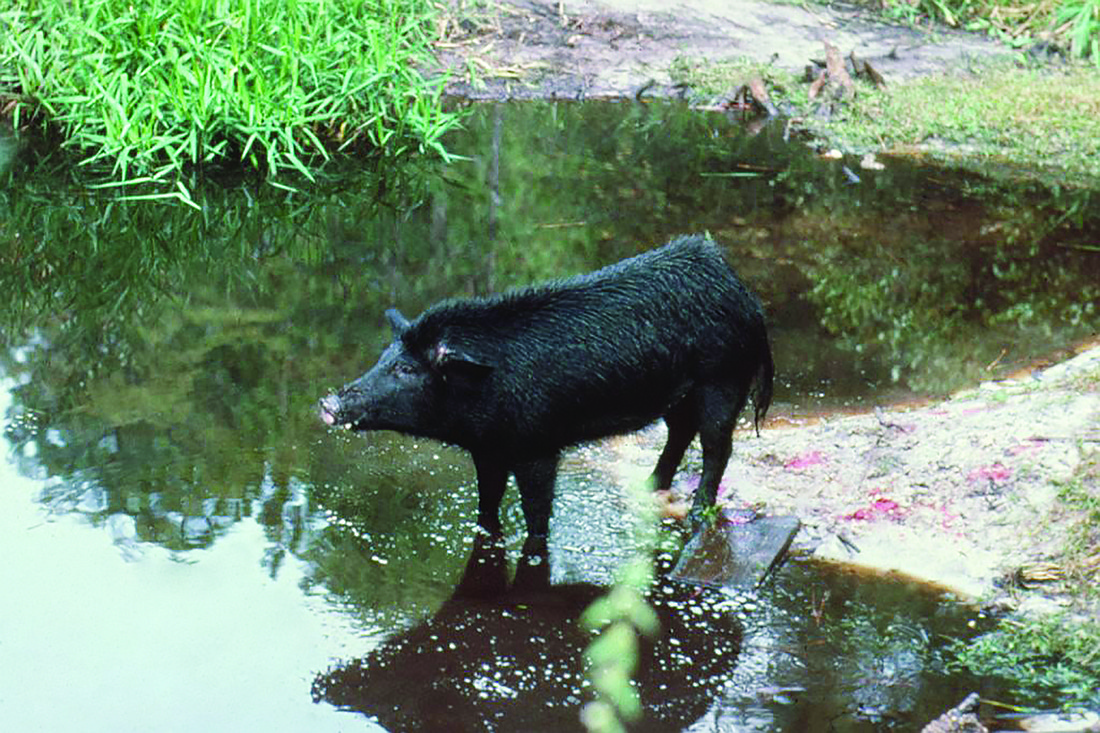- April 25, 2024
-
-
Loading

Loading

The first time Mike Finney saw a feral hog, it darted in front of his Mazda Miata on University Parkway. Unable to stop in time, Finney struck the pig, which rolled over after impact and then took off running.
That was in 2007, and Finney said the population migrated and quieted down. But his neighborhood, Edgewater, has experienced a resurgence in feral hogs over the last two years.
“The pigs are back in Edgewater,” he said.
Finney, a Community Development District 2 supervisor, brought up the issue at Thursday’s board meeting, hoping to persuade the district to be proactive in hiring a trapper.
For approximately seven months in 2014, there was “quite an episode,” he said. Lots of resident and district property was torn up, especially in the Islands areas — the places closest to preserve lands.
The district arranged for a trapper to come in, which reduced the activity, Finney said. But in the last few weeks, he and others have started seeing the tell-tale signs of a rebounding pig family: deep ruts through sod and mulch caused by furrowing pigs looking for grubs and acorns.
“I don’t know whether it’s survivors of that trapping effort or the building activity that probably stirs them up,” Finney said. “It’s not as bad as last year, but we wanted to make sure we started dealing with them sooner rather than later.”
His request spurred discussion about pig-trapper regulations in light of a recently adopted alligator trapping permit system in Lakewood Ranch.
Because the state provides permits to trap alligators through Lakewood Ranch, the state technically vets the trappers, and the CDDs do not employ trappers directly.
CDD attorney Andrew Cohen said there is no similar program for pig trappers. In fact, a resident could contract with a pig trapper individually to remove the animal.
Pig trappers, however, are hired by individual districts and, therefore, are required to provide proof of liability insurance to the board, and the district is responsible for vetting a trapper as it would a vendor.
Ryan Heise, district operations manager at Lakewood Ranch Town Hall, agreed to contact trappers to get the invasive species under control.
Gary Morse, public information officer for the Southwestern Florida Fish and Wildlife Conservation Commission, said feral hogs are a common problem. Classified as trespassing livestock, not as wildlife, these animals have been roaming the state since Spanish colonists settled in the state hundreds of years ago, he said.
“Feral hogs occur statewide in significant numbers, and they can do significant damage,” he said.
Often, hog problems occur in newly developed subdivisions. The construction exposes tubers and roots — the hog’s main diet — and then these food sources are covered up again by sod. The hogs easily dig through the sod with their trowel-like snouts.
“Homeowners come out and think a bulldozer went through their yard,” Morse said.
Morse said the only real solution is to trap nuisance hogs, but they will likely be an ongoing problem. Hogs can breed at a “prolific” rate, as long as food sources remain steady, sows can bear several litters of piglets a year. Other hogs will eventually move into the pocket left by the captured population.
“Eradication is virtually impossible,” he said. “You have to manage the problem as it occurs.”
Feral hogs do not usually pose a threat to people, but like any wild animal, they can become dangerous if cornered or injured.